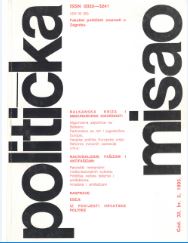Novi ustavi i modeli demokracije: problem većine
New Constitutions and Models of Democracy: The Majority Issue
Author(s): Kenneth JandaSubject(s): Geography, Regional studies, Constitutional Law, Government/Political systems, Inter-Ethnic Relations, Ethnic Minorities Studies
Published by: Fakultet političkih znanosti u Zagrebu
Keywords: democracy; new models; new constitutions; majority; minorities; Central and Eastern Europe;
Summary/Abstract: The author presents two alternative concepts of democracy: the procedural, which values systems according to the procedures that a government; makes use of in its day-to-day functioning, and the substantial, which insists on the political decisions’ content as the criterion of a system’s democracy. Based on these two concepts, the theoreticians of democracy have construed three different models of democracy (majority, pluralist and consensual),; the first two are on the line of the procedural, and the third of the substantial theory of democracy. While the advocates of the majority model are of the opinion that a government is primarily responsible to public opinion, i.e. the citizens’ majority, the pluralists consider democracy to be the government of several interest groups, of which none is powerful enough to impose its interest. The consensual model emphasizes the need for the government to guarantee, through its decisions, human and civil rights. This model also points out the need for protecting national minorities by employing mechanisms which enable their participation in the government. The author concludes that the latter model would best suit the societies of Central and Eastern Europe since they, due to their historical, social and cultural circumstances are not in the position to evolve Western models based on the procedural understanding of democracy.
Journal: Politička Misao
- Issue Year: XXXII/1995
- Issue No: 02
- Page Range: 149-166
- Page Count: 18
- Language: Croatian

